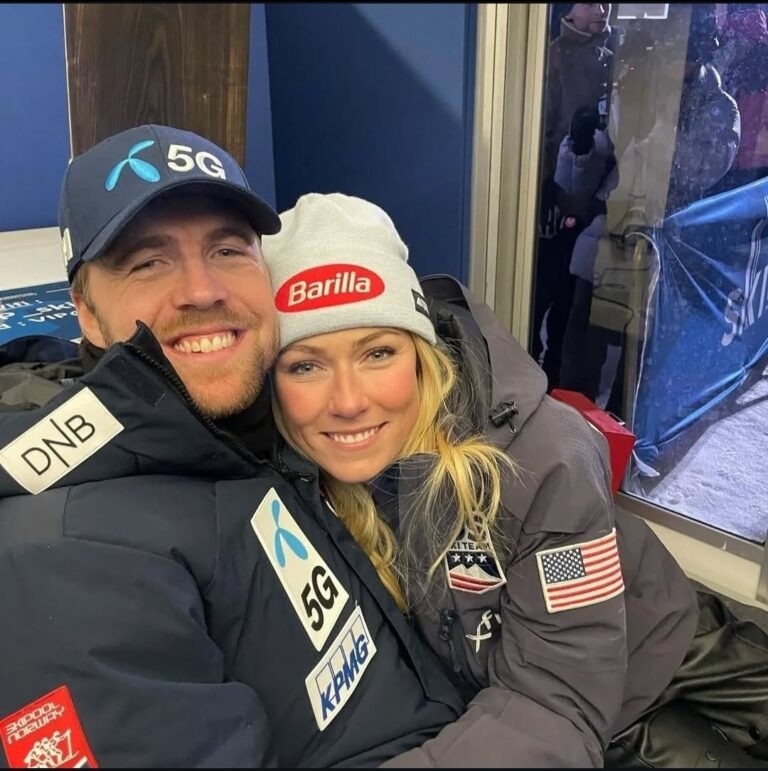As the floodlit slopes of Levi pulsed with the roar of Finnish fans, Mikaela Shiffrin etched another chapter in her unparalleled legacy, clinching a commanding victory in the women’s slalom opener to launch the 2025/26 FIS Alpine Ski World Cup season. But amid the celebrations, the narrative extended beyond the finish line to her fiancé, Aleksander Aamodt Kilde, the Norwegian speed specialist whose grueling recovery from a career-threatening injury draws daily motivation from Shiffrin’s unyielding drive
Shiffrin, the 30-year-old American phenom, powered through both runs on the demanding 56-gate Black course, posting a combined time of 1:48.92 to win by a decisive 1.66 seconds over Albania’s Lara Colturi. It marked her record-extending 102nd World Cup triumph—her 65th in slalom—and ninth career victory at Levi, the “Reindeer Cup” venue where she has now won every opening slalom since 2017. Germany’s Emma Aicher rounded out the podium in third (+2.59s), while U.S. teammate Paula Moltzan impressed with fourth place, signaling depth in the American squad.
“This one felt special—clean lines, no mistakes, just pure flow,” Shiffrin said post-race, her breath visible in the sub-zero air. “It’s early, but starting strong sets the tone for Milano Cortina.” The win vaults her to the top of both the slalom and overall standings after just two races, a stark contrast to her injury-plagued 2024/25 campaign that included an abdominal puncture in Killington.
Yet, as Shiffrin hoisted her bib number under the twinkling lights, her thoughts turned to Kilde, the 33-year-old two-time Olympic medalist who watched from afar in Colorado, where he’s ramping up rehab ahead of a potential Beaver Creek return in December. Kilde’s journey since his January 2024 crash at Wengen’s Lauberhorn—a high-speed tumble that dislocated his right shoulder, tore two ligaments, and lacerated his calf—has been a testament to resilience. What followed was a cascade of setbacks: nerve damage, a bone-damaging infection requiring a second surgery in October 2024, and a hamstring graft procedure in February 2025 to reconstruct the ravaged joint.
“I’m not the same athlete I was before,” Kilde admitted during a November 4 press call from Copper Mountain, where he’s training with the Norwegian and U.S. teams. “The shoulder will never be 100%, but I’m building toward full downhill runs. It’s frustrating when progress slows, but I see the light again.” He skipped the Sölden opener in October but remains optimistic for mid-December, with Norway’s sports director Claus Ryste echoing cautious hope: “Aleks is in peak physical shape—we’re positive, but timelines are fluid.”
At the heart of Kilde’s resolve is Shiffrin, whose own battles with injury and the emotional toll of Beijing 2022 have forged an unbreakable bond. In their October 29 podcast debut, What’s the Point with Mikaela Shiffrin, Kilde opened up about the “matter of life and death” fear during his crash and how Shiffrin’s example fuels his fire. “She works harder than all of us—that gives me inspiration to push extra,” he said, praising her post-injury comebacks. “We make each other better; her positivity through fear reminds me recovery is a process, not a sprint.”
Shiffrin, in turn, has been vocal about Kilde’s influence, crediting him with helping her embrace vulnerability after her father’s 2020 passing. Their shared world—training camps in Portillo, synchronized ABBA dances gone viral, and quiet evenings plotting post-Milano family life—has become a beacon for the sport’s power couples. “Aleks is my role model on and off the snow,” Shiffrin shared in a pre-Levi interview. “Watching him fight back? It makes every gate I ski feel like a tribute.”
As the circuit shifts to Killington next weekend, Shiffrin’s Levi masterclass reaffirms her as the slalom queen, but the real story unfolding is one of mutual elevation. For Kilde, each of Shiffrin’s podiums is a milestone marker on his road back; for her, his quiet grit in rehab sessions via FaceTime is the ultimate motivator. In a sport defined by speed and fragility, their partnership proves that true velocity comes from leaning on the one who inspires you to stand taller.
With Milano Cortina 2026 on the horizon, the duo eyes Olympic redemption—Shiffrin chasing a third slalom gold, Kilde a podium in super-G or downhill. As Kilde put it simply in their podcast: “Trust me—I’ll be back.” And with Shiffrin leading the charge, the Alpine world believes him.
Live coverage of the men’s Levi slalom continues today at 13:00 CET on FISAlpine.com
